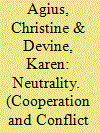|
|
|
Sort Order |
|
|
|
Items / Page
|
|
|
|
|
|
|
| Srl | Item |
| 1 |
ID:
117031


|
|
|
|
|
| Publication |
2012.
|
| Summary/Abstract |
In a 2008 International Politics article, David Patrick Houghton questions the importance of 'The Third Debate' in IR theory between 'positivism and postmodernism' and the relative worth of contrasting epistemological positions. Houghton's main argument is that the philosophical underpinnings of IR have not been central to what IR scholars actually do; specifically, the epistemological differences between positivists and postmodernists have little practical effect upon their empirical findings. In short, epistemology does not matter. This article analyses Houghton's thesis within the context of a dominant discourse in the discipline that derides postpositivism and, by corollary, rejects methodological pluralism incorporating both positivist and postpositivist approaches, what I refer to as 'epistemethodological pluralism'. This article questions the main assumptions underpinning this discourse by deconstructing the definition of 'postpositivism' that underpins the 'naysayer' arguments deriding or dismissing epistemological differences between positivism and postpositivism. Using examples of positivist and postpositivist research that focus on the foreign policy of the United States, European Union integration and Middle East politics, the article demonstrates how epistemological issues have a significant impact on empirical research in International Relations and illustrates the benefits of integrating the different epistemological approaches.
|
|
|
|
|
|
|
|
|
|
|
|
|
|
|
|
| 2 |
ID:
107614


|
|
|
|
|
| Publication |
2011.
|
| Summary/Abstract |
This article approaches 'neutrality' as an essentially contested concept and traces its meaning and purpose over centuries-long historical timelines and situated political, societal and security contexts. It distinguishes neutrality from other concepts such as 'neutralization' 'non-belligerency', 'non-alignment', 'military non-alignment', 'military neutrality' and 'non-allied'. The article explains the politics of defining neutrality in the current European political and legal landscape and in the context of shifting definitions and practices of war, peace, security and state sovereignty. This episteme-based analysis focuses on changes to neutrality in accordance with the rise and fall of particular empires and international actors over time, and changes to its status linked to the development and reification of particular meta-theoretically-based subfields of International Relations and Political Science, setting the background to this special issue of Cooperation and Conflict. A renewed emphasis on the normative aspects of neutrality (i.e. the role of domestic values, politics, preferences, history and mass publics in foreign policy formulation) is achieved by employing a range of perspectives, characterized by increased pluralism in levels of analysis and theoretical approaches. Through this pluralism, authors engage with (1) the strategic and normative drivers underpinning the norm of neutrality, (2) the potential for neutrals to serve as norm entrepreneurs in the field of peace promotion, (3) the tenuous legal status of elites' quasi-neutral foreign policy constructions underpinned by tensions between discourses and practices and (4) the discursive strategies underpinning the move from neutral states' traditional forms of neutrality to what is termed 'post-neutrality' in the current politico-legal context.
|
|
|
|
|
|
|
|
|
|
|
|
|
|
|
|
| 3 |
ID:
107617


|
|
|
|
|
| Publication |
2011.
|
| Summary/Abstract |
This article examines the content of concepts of neutrality articulated in elite and public discourses in the context of the development of the European Union's (EU) Common Security and Defence Policy (CSDP). In parallel with security and defence policy developments in successive EU treaties, many argue that the meaning of neutrality has been re-conceptualized by elites in EU 'neutral' member states (specifically, Austria, Finland, Ireland and Sweden) to the point of irrelevance and inevitable demise. Others argue that the concept of 'military' neutrality, as it is termed by elites in Ireland, or 'military non-alignment', as it is termed by elites in Austria, Sweden and Finland, meaning non-membership of military alliances, is compatible with the CSDP in the Lisbon Treaty. An investigation of these paradoxical discursive claims as to the status of neutrality yields findings of a divergence in public 'active' and elite 'military' concepts of neutrality that embodies competing foreign policy agendas. These competing, value-laden, concepts reflect tensions between, on the one hand, the cultural influences of a domestic constituency holding strong national identities and role-conceptions informed by a postcolonial or anti-imperialist legacy and, on the other hand, elite socialization influences of 'global actor' and common defence-supported identity ambitions encountered at the EU level that can induce discursively subtle yet materially significant shifts in neutral state foreign policy. The article concludes with an analysis of the compatibility of both 'military' neutrality and the 'active' concept of neutrality with the CSDP in the Lisbon Treaty and draws conclusions on the future role of neutrality both inside and outside the EU framework.
|
|
|
|
|
|
|
|
|
|
|
|
|
|
|
|
| 4 |
ID:
172978


|
|
|
|
|
| Summary/Abstract |
Karen Devine reviews nuclear non-proliferation and disarmament strategy in Irish foreign policy.
|
|
|
|
|
|
|
|
|
|
|
|
|
|
|
|
|
|
|
|
|